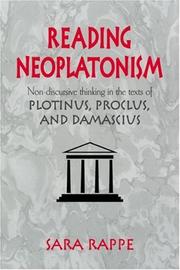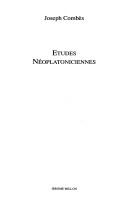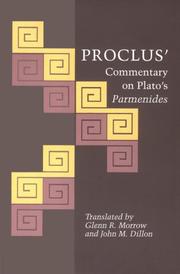| Listing 1 - 10 of 10 |
Sort by
|
Periodical
Year: 1986 Publisher: Paris Les Belles Lettres
Abstract | Keywords | Export | Availability | Bookmark
 Loading...
Loading...Choose an application
- Reference Manager
- EndNote
- RefWorks (Direct export to RefWorks)
Damascius. --- Damaskios.
Book
ISBN: 2841370070 Year: 1996 Volume: *4 Publisher: Grenoble Millon
Abstract | Keywords | Export | Availability | Bookmark
 Loading...
Loading...Choose an application
- Reference Manager
- EndNote
- RefWorks (Direct export to RefWorks)
Neoplatonism --- Neoplatonisme --- Néo-platonisme --- Damascius

ISBN: 9780521039420 9780511570629 9780521651585 Year: 1999 Publisher: Cambridge Cambridge University Press
Abstract | Keywords | Export | Availability | Bookmark
 Loading...
Loading...Choose an application
- Reference Manager
- EndNote
- RefWorks (Direct export to RefWorks)
Neoplatonism. --- Reasoning --- Methodology --- History. --- Plotinus. --- Proclus, --- Damascius.

ISBN: 2905614323 9782905614322 Year: 1989 Publisher: Grenoble: Millon,
Abstract | Keywords | Export | Availability | Bookmark
 Loading...
Loading...Choose an application
- Reference Manager
- EndNote
- RefWorks (Direct export to RefWorks)
Damascius Damascenus --- Neoplatonism. --- Neoplatonism --- Néo-platonisme --- Damaskios, --- Addresses, essays, lectures --- Damascius --- Alexandrian school --- Church history --- Hellenism --- Philosophy --- Philosophy, Ancient --- Platonists --- Theosophy
Book
ISBN: 286432055X 9782864320555 Year: 1987 Publisher: Lagrasse : Verdier,
Abstract | Keywords | Export | Availability | Bookmark
 Loading...
Loading...Choose an application
- Reference Manager
- EndNote
- RefWorks (Direct export to RefWorks)
Book
ISBN: 2251447326 9782251447322 Year: 2017 Publisher: Paris: Les Belles Lettres,
Abstract | Keywords | Export | Availability | Bookmark
 Loading...
Loading...Choose an application
- Reference Manager
- EndNote
- RefWorks (Direct export to RefWorks)
Notre siècle se place sous le signe de la fin des totalités, de la dissémination, de la réalité atomisée, des multiplicités pures. Autrement dit, l'être prend congé de l'un. Mais il est aisé de constater que la domination n'a pas pris fin pour autant. La multiplicité à son tour impose son règne, qui a pour nom mondialisation. Ce n'est donc pas le multiple qui nous libère, mais au contraire l'un, si du moins celui-ci se libère de l'être comme l'être s'est libéré de l'un : une unité qui ne conduit donc pas nécessairement à l'unitotalité. A cette fin, Comme un nouvel Atlas noue le dialogue entre les trois grands philosophes (Plotin, Proclus, Damascius) du néoplatonisme, qui seul, dans l'histoire de la philosophie, a osé penser la différence radicale de l'un par rapport à l'être. Dans cette perspective, l'un apparaît comme une philosophie de la liberté, susceptible de répondre au primat actuel du monde sensible et du devenir autant et mieux qu'aux formes intelligibles et aux idées éternelles de la cosmologie antique à laquelle cette pensée originellement se rattache.
Tout et parties (Philosophie) --- Métaphysique --- Néoplatonisme --- Multiple (philosophie) --- Un (philosophie) --- Totalité (philosophie) --- Damaskios, - approximately 480-approximately 550 --- Plotinus --- Proclus, - approximately 410-485 --- Plotin --- Proclus, - environ 410-485 --- Damascius, - environ 480-environ 550 --- Damaskios, approximately 480-approximately 550 --- Proclus, approximately 410-485 --- Proclus, environ 410-485 --- Damascius, environ 480-environ 550
Book
ISBN: 9782718608198 2718608196 Year: 2010 Publisher: Paris: Galilée,
Abstract | Keywords | Export | Availability | Bookmark
 Loading...
Loading...Choose an application
- Reference Manager
- EndNote
- RefWorks (Direct export to RefWorks)
Philosophical anthropology --- Proclus --- Plotinus --- Damascius Damascenus --- Neoplatonism. --- Mind and body --- Néo-platonisme --- Esprit et corps --- Philosophy. --- Philosophie --- Proclus, --- Damaskios, --- Criticism and interpretation. --- Neoplatonism --- Philosophy --- Néoplatonisme --- Corps (philosophie) --- Plotin, --- Damascius le Diadoque, --- Critique et interprétation --- Damascius le Diadoque, 045.?-05..? --- Néo-platonisme --- Alexandrian school --- Church history --- Hellenism --- Philosophy, Ancient --- Platonists --- Theosophy --- Body and mind --- Body and soul (Philosophy) --- Human body --- Mind --- Mind-body connection --- Mind-body relations --- Mind-cure --- Somatopsychics --- Brain --- Dualism --- Holistic medicine --- Mental healing --- Parousia (Philosophy) --- Phrenology --- Psychophysiology --- Self --- Psychological aspects --- Proclo, --- Proclo di Atene, --- Proclo di Costantinopoli, --- Proclo Licio Diadoco, --- Proclus Arabus, --- Proclus Diadochus --- Proclus Diadochus, --- Proclus Lycius, --- Prokl, --- Prokl Diadokh, --- Proklos, --- Proklos Diadochos, --- Proklus, --- Πρόκλος, --- Πρόκλος Πλατωνικός Διάδοχος, --- Πρόκλος Διάδοχος, --- פרוקלוס --- Plotin --- Plotinos --- Damascius, --- Δαμάσκιος, --- Néoplatonisme. --- Esprit et corps. --- Boluoding --- Iflūṭīn --- Plotino --- Plōtinos --- Plotinus, --- Plotyn --- Πλωτι̂νος --- פלוטינוס --- أفلوطين --- Critique et interprétation. --- Mind and body - Philosophy --- Proclus, - approximately 410-485 --- Damaskios, - approximately 480-approximately 550 --- Néoplatonisme. --- Critique et interprétation --- Critique et interprétation.
Book
ISBN: 9780691149974 9780691137223 0691137226 9781400832873 140083287X 0691149976 Year: 2011 Publisher: New Jersey Princeton University Press
Abstract | Keywords | Export | Availability | Bookmark
 Loading...
Loading...Choose an application
- Reference Manager
- EndNote
- RefWorks (Direct export to RefWorks)
In Civilizations of Ancient Iraq, Benjamin and Karen Foster tell the fascinating story of ancient Mesopotamia from the earliest settlements ten thousand years ago to the Arab conquest in the seventh century. Accessible and concise, this is the most current and authoritative book on the subject. With illustrations of important works of art and architecture in every chapter, the narrative traces the rise and fall of successive civilizations and peoples in Iraq over the course of millennia--from the Sumerians, Babylonians, and Assyrians to the Persians, Seleucids, Parthians, and Sassanians. Ancient Iraq was home to remarkable achievements. One of the birthplaces of civilization, it saw the world's earliest cities and empires, writing and literature, science and mathematics, monumental art, and innumerable other innovations. Civilizations of Ancient Iraqgives special attention to these milestones, as well as to political, social, and economic history. And because archaeology is the source of almost everything we know about ancient Iraq, the book includes an epilogue on the discovery and fate of its antiquities. Compelling and timely, Civilizations of Ancient Iraqis an essential guide to understanding Mesopotamia's central role in the development of human culture.
Civilization, Assyro-Babylonian. --- Assyria --- Babylonia --- Iraq --- Antiquities. --- Social life and customs. --- History --- Civilization, Assyro-Babylonian --- Assyro-Babylonian civilization --- Babylonian civilization --- Civilization, Babylonian --- Vavilonii︠a︡ --- Bavel --- Bābil --- Babylonien --- Sumer --- Afghanistan. --- Akkadian literature. --- Alexander the Great. --- Amorites. --- Amu Darya River. --- Annunitum. --- Archimedes screw. --- Assurbanipal. --- Assyriology. --- Babylon, site. --- Balikh River. --- Berlin Museum. --- British Museum. --- Carchemish. --- Chaldaean Catholics. --- Christianity. --- Damascius. --- Eannatum. --- Erlenmeyer Collection. --- Esarhaddon. --- Gaugamela. --- Gnosticism. --- Greek language. --- Hammurabi. --- Hassuna ware. --- Iraq Museum. --- Jeremiah. --- Jesus. --- Julius Caesar. --- Kudur-nahhunte. --- Lachish. --- Manishtusu. --- Nabopolassar. --- accounting. --- astronomy. --- bevel-rimmed bowls. --- caravanserais. --- chronicles. --- decipherment. --- domestication. --- education. --- families. --- fertility. --- frankincense. --- furniture. --- horoscopes. --- iconography. --- kudurrus. --- literacy. --- mathematics. --- minstrels.
Book
ISSN: 00791687 ISBN: 9789004439054 9004439056 9004439099 9789004439092 Year: 2021 Volume: 156 Publisher: Leiden ; Boston : BRILL,
Abstract | Keywords | Export | Availability | Bookmark
 Loading...
Loading...Choose an application
- Reference Manager
- EndNote
- RefWorks (Direct export to RefWorks)
In The First Principle, Jonathan Greig examines the philosophical theology of the two Neoplatonists, Proclus and Damascius (5th-6th centuries A.D.), on the One as the first cause. Both philosophers address a tension in the Neoplatonic tradition: namely that the One was seen as absolutely transcendent, yet it was also seen as intimately related to other things as the source of their unity and being. Proclus' solution is to posit intermediate causes after the One, while Damascius posits a distinct principle, the 'Ineffable', above the One. This book provides a new, thorough study of the theories of causation that lead each to their respective position and reveals crucial insights involved in a rigorous negative theology employed in metaphysics.
Causation --- First philosophy --- One (The One in philosophy) --- Neoplatonism --- Proclus, --- Damaskios, --- Causation. --- First philosophy. --- Neoplatonism. --- One (The One in philosophy). --- Causality --- Cause and effect --- Effect and cause --- Final cause --- Beginning --- God --- Metaphysics --- Philosophy --- Necessity (Philosophy) --- Teleology --- Damascius, --- Δαμάσκιος, --- Proclo, --- Proclo di Atene, --- Proclo di Costantinopoli, --- Proclo Licio Diadoco, --- Proclus Arabus, --- Proclus Diadochus --- Proclus Diadochus, --- Proclus Lycius, --- Prokl, --- Prokl Diadokh, --- Proklos, --- Proklos Diadochos, --- Proklus, --- Πρόκλος, --- Πρόκλος Πλατωνικός Διάδοχος, --- Πρόκλος Διάδοχος, --- פרוקלוס --- Proclus, - approximately 410-485 --- Damaskios, - approximately 480-approximately 550

ISBN: 0691073058 0691020892 9780691020891 0691180407 0691236615 Year: 1987 Publisher: Princeton (N.J.): Princeton university press,
Abstract | Keywords | Export | Availability | Bookmark
 Loading...
Loading...Choose an application
- Reference Manager
- EndNote
- RefWorks (Direct export to RefWorks)
This is the first English translation of Proclus' commentary on Plato'sParmenides. Glenn Morrow's death occurred while he was less than halfway through the translation, which was completed by John Dillon. A major work of the great Neoplatonist philosopher, the commentary is an intellectual tour de force that greatly influenced later medieval and Renaissance thought. As the notes and introductory summaries explain, it comprises a full account of Proclus' own metaphysical system, disguised, as is so much Neoplatonic philosophy, in the form of a commentary.
Reasoning --- -Argumentation --- Ratiocination --- Reason --- Thought and thinking --- Judgment (Logic) --- Logic --- Early works to 1800 --- Plato --- Socrates --- Zeno of Elea --- Aflāṭūn --- Aplaton --- Bolatu --- Platon, --- Platonas --- Platone --- Po-la-tʻu --- Pʻŭllatʻo --- Pʻŭllatʻon --- Pʻuratʻon --- Πλάτων --- אפלטון --- פלאטא --- פלאטאן --- פלאטו --- أفلاطون --- 柏拉圖 --- 플라톤 --- Socrate --- Socrates Constantinopolitanus Scholasticus --- Zeno, --- Form --- Philosophical perspectives --- Socrates. --- Argumentation --- Plato. --- Zenón, --- Zénon, --- Zenon, --- Ζήνων, --- Zēnōn, --- Platon --- Platoon --- Form (Philosophy) --- Parmenides --- Early works to 1800. --- Raisonnement --- Ouvrages avant 1800 --- Платон --- プラトン --- Zeno, - of Elea --- Sokrates --- Sokrat, --- Sokrates, --- Suqrāṭ, --- Su-ko-la-ti, --- Sugeladi, --- Sokuratesu, --- Sākreṭīsa, --- Socrate, --- سقراط, --- Σωκράτης, --- Aeschylus. --- Alexander of Aphrodisias. --- Allegory. --- Ammonius Saccas. --- Analytic–synthetic distinction. --- Anecdote. --- Antithesis. --- Aporia. --- Aristotelianism. --- Aristotle. --- Axiom. --- Callicles. --- Cephalus. --- Chaldean Oracles. --- Comprehension (logic). --- Cratylus (dialogue). --- Creation myth. --- Critique. --- Damascius. --- Demiurge. --- Dialectician. --- Dionysius the Areopagite. --- Dionysus. --- Endoxa. --- Epicurus. --- Existence. --- First principle. --- Form of life (philosophy). --- Glaucon. --- Hippias. --- Hypostasis (philosophy and religion). --- Hypothesis. --- Hypothetical syllogism. --- Iamblichus. --- Idealism. --- Identity (philosophy). --- Immutability (theology). --- Intellect. --- Logos. --- Menexenus (dialogue). --- Metaphysics. --- Middle Platonism. --- Middle term. --- Multitude. --- Neoplatonism. --- Nicholas of Cusa. --- Nous. --- Parmenides (dialogue). --- Parmenides. --- Phaedrus (dialogue). --- Philebus. --- Philosopher. --- Philosophical language. --- Philosophy. --- Phronesis. --- Platonic Theology (Ficino). --- Platonic realism. --- Platonism. --- Plotinus. --- Plutarch of Athens. --- Plutarch. --- Polemic. --- Potentiality and actuality. --- Pre-Socratic philosophy. --- Premise. --- Pronoia (psychology). --- Protagoras (dialogue). --- Pyrrhonism. --- Pythagoras. --- Pythagoreanism. --- Reality. --- Reason. --- Reductio ad absurdum. --- Samuel Taylor Coleridge. --- Scholasticism. --- Second Letter (Plato). --- Socratic method. --- Sophist. --- Stoicism. --- Subject (philosophy). --- Suggestion. --- Superiority (short story). --- Syllogism. --- Symposium (Plato). --- Syrianus. --- Term logic. --- The Philosopher. --- Theaetetus (dialogue). --- Themistius. --- Theology. --- Theophrastus. --- Theory of Forms. --- Theory. --- Third man argument. --- Thought. --- Timaeus (dialogue). --- Treatise. --- Writing. --- Zeno of Elea. --- -Early works to 1800
| Listing 1 - 10 of 10 |
Sort by
|

 Search
Search Feedback
Feedback About UniCat
About UniCat  Help
Help News
News